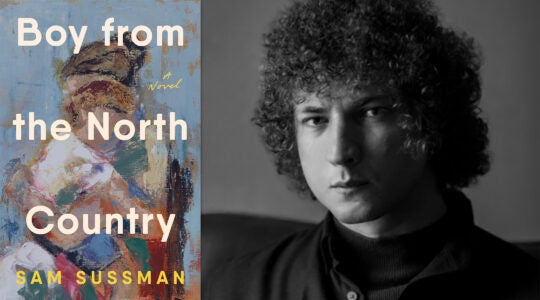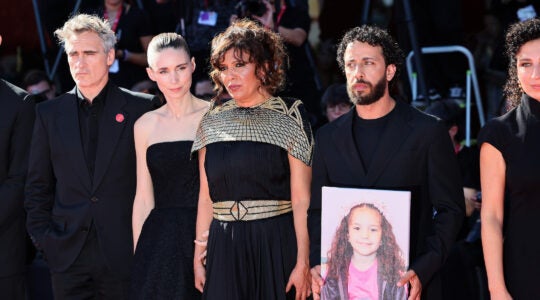
Jenni Wolfson in “Rash” talks about her childhood in Scotland and work for the United Nations in Rwanda. (Melbourne Sibblies)
NEW YORK (JTA) — At the start of “Rash,” Jenni Wolfson appears onstage in a green peasant skirt and khaki top to the sound of cascading gunfire. Her long brown hair is unceremoniously pulled back with a black scrunchie. From a trunk she pulls out a flak jacket and puts it on.
Wolfson then takes center stage and starts speaking about an incident from her years of U.N. service in post-genocide Rwanda.
In her Scottish brogue, she talks of being forced from her vehicle by Hutu rebels with her fellow human rights observers, stripped of her identification and threatened with death, of a hand running up her thigh as one of her abductors whispered in her ear, “We’re going to have fun with you.”
Rising from her knees, she slips into a story about her time in a Glasgow high school, when a cute boy tossed a half-penny coin in front of her and said, “Pick that up, Jew.”
The juxtaposition is not exactly subtle: Her experience of discrimination as a Jew led directly to the human rights work she wound up pursuing after completing her master’s degree in the field at Essex University.
“If I didn’t have that firsthand experience of being discriminated against on the basis of religion, then I may have never ended up going into human rights,” she told JTA over coffee at a cafe near her office at WITNESS, a nonprofit that trains activists to use video to document humanitarian abuses. Wolfson, 43, is the managing director.
Onstage during “Rash,” a one-woman show now playing in New York as part of the All for One Festival, tea is Wolfson’s beverage of choice. Born in Scotland, a country of just 5,000 Jews, Wolfson was raised in a traditionally Jewish family, observing holidays and rituals, though not stringently. It was during a Friday-night family dinner that Wolfson learned the United Nations had offered her a job as a human rights monitor in Rwanda.
“But Jenni-kins, you can type more than 80 words a minute,” her father said, protesting her intention to deploy to the violent central African nation.
In Rwanda, it wasn’t her typing prowess but her gift of gab that proved most useful as she collected prisoner testimonies and investigated claims of atrocities. She would spend three years there in prisons filled with Hutus accused of genocidal crimes.
Her superiors at the United Nations credit her volubility for influencing the Hutu rebels to release her and her colleagues, she says in the play. Nowadays she uses the same talent for narrative at WITNESS. Storytelling, it seems, pervades all of Wolfson’s work, on and off the stage.
Not that the stage is her natural habitat. She began taking acting classes on a lark when she moved to New York to work for UNICEF after returning from field work in Rwanda and Haiti. She trained UNICEF employees being sent abroad to manage crises, teaching them how to demobilize child soldiers and what to do if they’re taken hostage.
“Unbeknownst to UNICEF, the entire training schedule was built around my classes and showcases,” she explained.
At first, Wolfson brought fictional monologues to class. But one night she decided to tell a short story from her time in Rwanda.
“I read it and I looked up and no one was speaking. A few people were crying,” she recalled. “They said, ‘Dump your fiction. We really want to hear about what’s happened in your life.’ ”
“She was a walking New York Times article,” said Jen Nails, who taught Wolfson in a solo performance workshop at the People’s Improv Theater and is directing this production of “Rash.” “She was an accessible, normal woman who we can identify with, but had been a witness to all of these horrific crimes.”
Every week after, Wolfson brought in stories drawn from her experiences in Rwanda. At the end of the class, Nails told Wolfson that she had a one-woman show on her hands. Eventually Wolfson was persuaded to consolidate her experiences into a play.
“When I first started writing the play, I had nightmares for the first time,” she said. Up until that class, Wolfson had rarely spoken about her time in Rwanda.
The result of this artistic therapy is “Rash,” so-called for the skin irritation that developed under her eye when she first began working in Rwanda. The title also speaks to her state of mind and personal decision-making style during this time. During the play, she confesses to the foolhardy things she did to visit her boyfriend, a Cameroonian animist and fellow U.N. employee, including driving alone on roads rigged with landmines.
Wolfson first performed “Rash” in 2007 and has since traveled the country with the show. She even performed it in her native Scotland with her parents in the audience. But this run in New York, which ends Sunday, marks the first time she has stepped back into her younger self since becoming a mother.
“I wanted to see what it was like to perform onstage being a mum because I feel like I’m a very different person,” she said. “I’m much more emotional and I feel more connected to my story.”
She is also much more sympathetic to her parents’ perspective.
“It wasn’t until I had a child three years ago that I realized what I put my parents through,” Wolfson said.
Though her parents’ sleepless nights may be over, Wolfson plans to take her show to college campuses, which just might persuade other young people to travel abroad and make their parents sick with worry. At the end of “Rash,” Wolfson imagines a phone call like the one she answered at 27 that sent her to Rwanda.
“Can you leave next week for Somalia?” she imagines being asked.
In a past life, Wolfson probably would have packed her bags, her rashness overcoming concerns for her personal safety and her parents’ frayed nerves. But now it’s someone else’s call to answer.
JTA has documented Jewish history in real-time for over a century. Keep our journalism strong by joining us in supporting independent, award-winning reporting.





